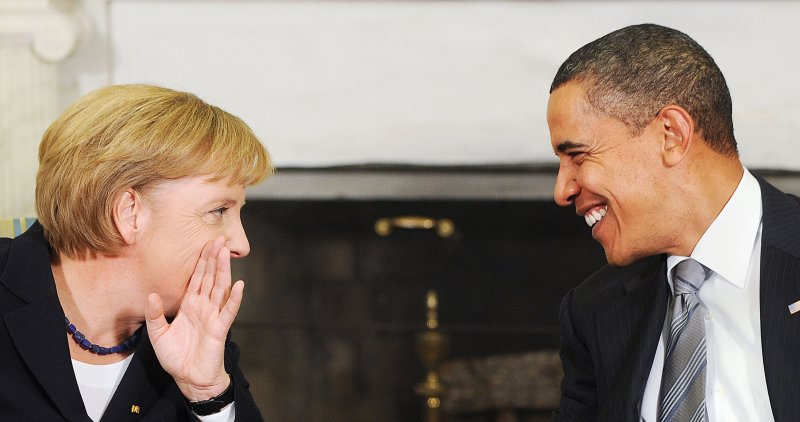U.S. President Barack Obama meets with German Chancellor Angela Merkel in the Oval Office of the White House on November 3, 2009 in Washington, DC. UPI/Olivier Douliery/Pool |
License Photo
MUNICH, Germany, Feb. 7 (UPI) -- German Chancellor Angela Merkel, British Foreign Minister William Hague and other Western leaders called for a joint international effort to thwart cyberattacks.
If such an international pact isn't created, a dangerous cyber arms race will ensue, Merkel warned at a high-level security conference that ended Sunday in Munich.
Hague and German Interior Minister Thomas de Maiziere at the same conference called for greater international coordination when building up cyber defense lines.
Cybersecurity made headlines last year when a computer virus called Stuxnet was used to sabotage Iran's uranium enrichment facilities. Western governments and companies have long complained about cyberattacks, some of them believed to have originated in China.
De Maiziere said the German government's Web presence is attacked "four, five times per day." He said the Group of Eight should tackle the issue at its next summit.
Hague said British defense companies -- and thus British defense security interests -- were targeted last year.
"A malicious file posing as a report on a nuclear Trident missile was sent to a defense contractor by someone masquerading as an employee of another defense contractor," Hague said. "Good protective security meant that the e-mail was detected and blocked but its purpose was undoubtedly to steal information relating to our most sensitive defense projects."
Hague said Britain identified cyberattacks and cybercrime among its top five security issues and intends to create a cybersecurity program that is aimed at boosting Britain's cyber defense. Germany is planning to submit legislation on cybersecurity to Parliament this spring, de Maiziere said.
NATO Secretary-General Anders Fogh Rasmussen said smaller nations, that can't necessarily develop their own responses to cyber threats, could work together. "NATO can help and advise them on how to protect their critical information infrastructures," he said.
Cyber criminals have long targeted companies.
Rene Obermann, the head of Germany's largest telecommunications company Telekom, which runs the country's digital network, said it was faced with 200,000 cyberattacks in December alone.
While companies used to come to governments to get protection from traditional threats, the industry today is often better prepared to deal with attacks online, Rasmussen said, urging companies to share their know-how with governments.
"We must find better ways through public-private partnerships to explore the military potential of emerging technologies, and to involve industry sooner and more closely," he said.





